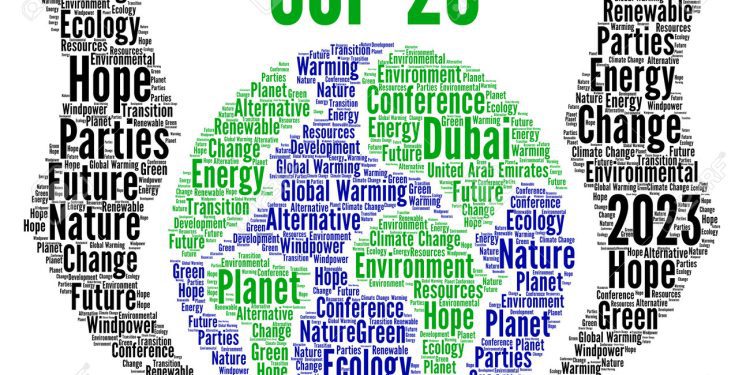As stakeholders head to the United Nations Conference of Parties (COP 28), holding in Dubai, United Arab Emirates (UAE) from November 30th through to December 12, Nigerian civil society organisations (CSOs) and other stakeholders who are billed to attend have been advised to speak in one voice as they present Nigeria’s challenges and opportunities for climate mitigation and adaptation.
This appeal was made at a pre-COP28 CSOs and multi-stakeholders roundtable, themed: “Pre-COP28 CSOs and Multi-Stakeholder Engagement,” which held recently in Lagos, and organized by the Centre for 21st Century Issues (C21st), in partnership with society for Planet and Prosperity (SPP) and EnviroNews Development Network (Endenet), with support from the Foreign Commonwealth Development Office (FCDO).
Speaking at the event, the Director, Department of Climate Change, Department of Climate Change, Federal Ministry of the Environment, Dr. Iniobong Abiola-Awe noted that the conference is a pivotal moment of collaboration to participate in the upcoming conference in Dubai.
Abiola-Awe, speaking during Nigeria’s Climate Change-focused CSOs for active participation in COP 28, said that the United Nations conference will enable Nigerian CSOs and climate change experts to forge solutions that will safeguard the climate as they present their challenges in unity.
She noted that grassroots participation is instrumental to addressing climate change, adding that stakeholders’ “Engagement in the discussion is paramount to embark on the fight against climate change. It is an opportunity to demonstrate the power of collaboration with the government and the community.”
The climate change boss said that in order to ensure that the collective effort leaves no one behind, the CSOs should send the position of Nigeria together.
Also, Deputy Executive Director, the Women Empowerment Programme (WEP), John Baaki, said that Faith-Based Organisations (FBOs) should be given the opportunity to form an informal group to enable them to speak with one voice.
He said that the UN conference and convention creates a platform, structure and process through which NGOs and stakeholders can engage and add their voices to the process.
On the roles of constituencies in climate change, Baaki noted that they should support the accreditation of participants to the UNFCC Conference and serve as a conduit through which the UNFP passes information to different groups.
The WEP director, who urged members of the constituency to amplify the voices of local communities at the climate change conference, added: “Constituencies can influence negotiations through supporting negotiators with the information needed to make input to negotiations.
“Organize peaceful protest during climate change conferences to push their demands, organize across constituencies to influence their decisions; organize formal meetings with negotiations to sell their positions; participate in and observe official open meetings to inform their advocacy actions; conduct and present research findings and recommendations to parties during side events.”
According to Baaki, the African group of negotiators will also be at the conference to negotiate on behalf of the governments of Africa.
On the roles of government in climate change, he noted that they should “Organise capacity building events for members to enhance their states of negotiations and how to contribute to shaping it.”
Organizations are encouraged to join a constituency that is relevant to the work they do while at the UN climate change meeting.
On his part, Programme Officer of, Nigerian Conservation Foundation, Solomon Adefolu “On the role of CSOs in climate negotiations”, said that climate change negotiations are avenues that allow parties to come together to reach an agreement through deliberations in accordance with regional priorities on issues related to climate change.
He said that climate negotiations are usually done by negotiators on behalf of the government parties to the convention, adding: “Some are selected from the ministries in charge of climate change, consultants with experience on climate change.”
On why climate change negotiations are necessary, he noted that chief among them is “To keep warming at 1.5 degrees celsius reach well below 2.0 degrees celsius in line with the Paris Club Agreement.”
“The bigger the constituency, the more voice they have and the more pressure they can put. Constituencies are a formidable force to ensure climate change is contained,” he added.
According to him, issues to be negotiated include vulnerability, mitigation, technology, carbon market, loss and damage agriculture, ocean, forest, gender, climate, finance, and global stock trade, adding: “It will be a conference to finalise the global stock.”
He stated that the CSOs can influence negotiations through decision texts, fundraising, and reference support during national and sub-national lobbies; working globally to achieve global goals rather than working in silos and not seeing any results.
Adefolu urged the CSOs to “See themselves as the eyes, ears and conscience of the world (watchdog) i n the negotiation process; align with a coalition or partnership on the particular cause of interest, e.g. nature, justice; pre-cop events and demands for international priorities; align with coalition or partnership on the particular cause of interest; make noise about your interest, campaigns, represent your country as a negotiator if you have the expertise. Follow and input into negotiations.
Director, EnviroNews Development Network (EndNet), Michael O. Simere, while speaking on how the CSOs can utilize the media as one of the most important components of the conference of Parties (COPs), said some CSOs should come up with their media groups.
He urged Nigerian CSOs to collaborate more with the media so as to engage very well with parties, as admitted observers are encouraged to build press conferences.
He added: “There is a need for better engagement of the media and CSOs at the conference.”

